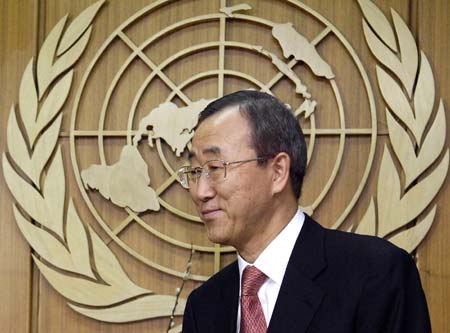UN chief backs death penalty appeal
(AP)Updated: 2007-01-04 11:02
UNITED NATIONS - Secretary-General Ban Ki-moon backs an appeal by the UN human rights chief to Iraq's president to refrain from executing two of Saddam Hussein's co-defendants, his spokeswoman said Wednesday.
|
|
The United Nations has an official stance opposing capital punishment and Ban's predecessor Kofi Annan reiterated it frequently. But Ban ran into trouble on his first day of work as secretary-general Tuesday over Saddam's execution when he failed to state the UN's opposition to the death penalty and said capital punishment should be a decision of individual countries.
UN High Commissioner for Human Rights Louise Arbour appealed Wednesday to Iraqi President Jalal Talabani not to execute two Saddam co-defendants - Barzan Ibrahim, Saddam's half brother and former intelligence chief, and Awad Hamed al-Bandar, former head of Iraq's Revolutionary Court.
Montas said Ban supported Arbour's appeal.
Arbour made a similar appeal last week after the death sentences for Saddam and the two others were upheld by the appeals court.
Despite her appeal and others, Saddam was hanged Saturday, provoking international criticism over the taunting and baiting of the former Iraqi dictator by some in the chamber as he awaited death with a noose around his neck.
His two co-defendants are now awaiting a similar fate.
Ibrahim and al-Bandar were sentenced to death with Saddam on Nov. 5 for the slaying of nearly 150 Shiites following a 1982 attempt on Saddam's life in the town of Dujail north of Baghdad. Saddam was put to death for crimes against humanity in the same case.
The execution has reignited an ongoing discussion at the UN over a total ban on the death penalty, which the majority of member states opposed during the last General Assembly debate several years ago.
"His opinion is that we should press for the abolition of capital punishment but it should be a slow process," Montas said of Ban. "Until the matter is resolved, he respects the right of member states to have their own positions on it."
The death penalty is legal in Ban's homeland, South Korea, as it is in many other countries including the United States, Russia, China and much of the Middle East.
But Montas said "the secretary-general strongly believes in the wisdom of Article 3 of the Universal Declaration of Human Rights which states, `everyone has the right to life, liberty and security of person.'"
"In that context, he fully endorses the call made today by Louise Arbour for restraint by the government of Iraq in the execution of the death sentences imposed by the Iraqi high tribunal," she said.
|
||
|
||
|
|

